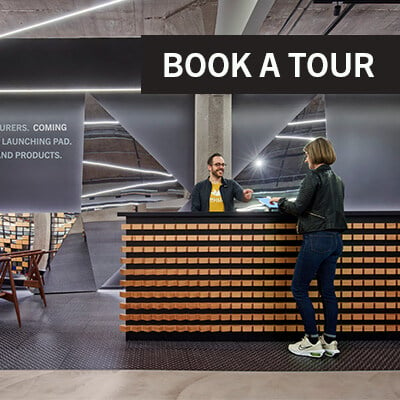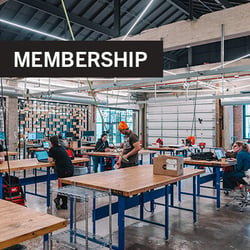Today's Insights from Leading Healthcare Investors and Founders
In April, mHUB convened some of the most experienced voices in healthcare innovation, venture capital, and impact strategy for a frank and timely discussion on the state of MedTech funding. No Easy Money: Navigating MedTech Investment featured a series of talks and panel conversations that unpacked how capital is flowing, what makes Chicago a compelling place to build and back startups, and how founders can adapt to shifting expectations in today’s economic climate.
Whether you're a MedTech founder preparing to raise, an investor seeking insight into emerging trends, or a stakeholder in Chicago’s innovation economy—this recap captures the conversations shaping the future of healthcare technology.

Part 1: State of the Union — The Venture & Economic Outlook
Julia Maloney, JPMorgan Life Sciences Commercial Banking
Julia Maloney opened the day with a high-level analysis of the MedTech venture landscape and broader economic forces impacting investment. Representing JPMorgan’s Life Sciences group, Julia works with companies from pre-seed through commercialization and offered key data from the bank’s Q4 MedTech report.
Despite a multi-year dip in deal volume, total MedTech venture funding rose to $19.1 billion in 2024—up 12% from 2023. Investors showed a clear shift toward larger, later-stage deals, with 42 investments exceeding $100 million and a notable return of early-stage capital in the seed and Series A range.
Julia emphasized that U.S. venture firms are still well-capitalized with nearly $290 billion in dry powder, but ongoing economic uncertainty is slowing new fundraising. Policy shifts, trade tariffs, and leadership changes at agencies like the FDA are also shaping investor behavior.
Meanwhile, M&A activity surged in 2024 with 305 transactions totaling $63.1 billion, while MedTech IPOs began to return after a quiet 2023. However, early 2025 data suggests a slower start, largely tied to market volatility.
“We’re revising our macro-outlook weekly—sometimes daily,” Julia shared. “There are simply too many moving parts to make long-term forecasts with certainty.”

Part 2: Investing in Illinois — Making the Case for Chicago
Rebecca Motley, Director of Life Sciences, World Business Chicago
In the second session, Rebecca Motley of World Business Chicago (WBC) spotlighted state-level incentives and local strategies aimed at strengthening Illinois’ startup ecosystem—particularly for health innovation.
Rebecca outlined two key tools that early-stage founders and investors should know about. First, the Illinois Angel Investment Tax Credit offers investors a 25% tax credit for qualifying investments in local companies, or 35% for companies led by underrepresented founders. Second, the state’s fund-of-funds program supports VC firms that commit to investing in Illinois-based startups, funneling more capital into the region.
She also highlighted WBC’s efforts to educate and engage high-net-worth individuals across real estate, hospitality, and manufacturing—industries that have historically driven wealth in Chicago but are still new to startup investing.
“There’s a lot of money in this region. Our job is to help people understand how that capital can drive innovation in healthcare,” Rebecca explained.
World Business Chicago continues to play a crucial role in attracting businesses to the region and supporting the ones already here. For startups raising in Illinois, the tools—and the opportunities—are growing stronger.

Part 3: Real Talk on Fundraising — A Panel with Founders & Funders
Featuring: Kurt Akers of Endeavor Health, Ayo Roberts of Sonder Capital, Sandra Laney of Strategic Journey Lab, and Tyler Zanon of Endoshunt.
In the final session, a panel of fund managers, strategics, and founders dug into the realities of raising capital in today’s MedTech environment. Moderated by mHUB’s Alex Lambert, the discussion was refreshingly candid—offering tactical advice and hard-won lessons from both sides of the fundraising table.
Investors agreed that three core elements move a company from “interesting” to “investable”: a well-articulated, clinically validated value proposition; a team with deep technical and commercial understanding; and a grounded, credible market sizing approach. The ability to show real understanding of clinical workflows—and how a product fits into or improves them—was another differentiator.
But the conversation also surfaced common mistakes. Founders often overstate market potential, underplay the time and trust required to secure funding, and fail to tailor their pitch to the unique motivations of different investors.
Sandra Laney, President of the Strategic Journey Lab, emphasized the importance of integrating impact into business planning and investor conversations—not as an add-on, but as a core part of the story.
“Money moves at the speed of trust,” she said. “Especially in philanthropy and family office funding, that alignment around mission and values is essential.”
Panelists also discussed deal structures. Convertible notes and SAFEs are still the most common pre-seed vehicles, especially in MedTech where valuation can be hard to pin down early. For impact-driven startups, opportunities for non-dilutive capital—like donor-advised funds (DAFs) and program-related investments (PRIs)—are growing, but founders need to speak the language of outcomes and mission alignment to unlock them.

Closing the session, founder Tyler Zanon reflected on what he wished he knew earlier in his own fundraising journey: start building relationships well before you're ready to raise. In his case, connections made 18 months earlier were just beginning to result in actual investment.
“It’s not about chasing checks—it’s about showing up consistently and helping investors understand who you are, not just what you're building.”
Final Thoughts: Capital with Intention
No Easy Money delivered what its title promised—an honest, multifaceted look at what it takes to build and fund a MedTech company in 2025. From macroeconomic challenges to local incentives and personal relationship-building, the path to investment is rarely linear.
But Chicago is proving it has both the infrastructure and investor appetite to lead the next wave of health innovation. With growing access to capital, strong institutional support, and a startup community committed to impact, the message is clear: MedTech founders don’t just have a home in Chicago—they have a launchpad.
Stay tuned for upcoming events and initiatives from mHUB as we continue to bring together the people, partners, and capital driving innovation forward.




.jpg?width=352&name=Zenblen%20Kiosk-mHUB%20Annual%20Report%20(2).jpg)
